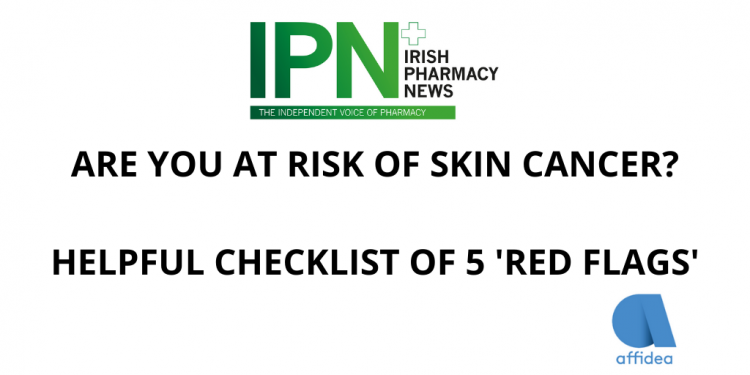- Skin cancer is now Ireland’s most common type of cancer – so make sure you’re protected!
Irish people are being urged to take steps to protect their skin from the sun’s harmful rays, particularly as we begin to emerge from the prolonged Lockdown period.
Skin cancer is now Ireland’s most common type of cancer, and with this in mind, Affidea ExpressCare Clinic in Tallaght, which offers a skin cancer treatment service, has developed a helpful checklist of five things to consider if you’re worried about skin cancer. The checklist outlines a number of lifestyle factors – both current and historic – that can increase your risk of developing skin cancer, as well as some ‘red flags’ that might indicate you are at a higher risk of the disease.
The checklist, outlined below, has been devised by Mr. Fuan Chan, MD FRCSI (PLAST), a fully accredited consultant plastic surgeon, who is the clinical advisor for plastic surgery and dermatological services at Affidea ExpressCare.
The Affidea ExpressCare Clinic Skin Cancer Checklist is as follows:
- Are you in any particular risk categories?
Your skin tone can be a factor, and those with paler skin tones are more at risk. It’s due to a lack of a pigment called melanin. Melanin not only gives skin its colour, it provides protection from the sun’s UV rays. Pale skin tones have less of this in-built protection and can be more at risk, but it is a misconception about skin cancer to think that only pale skinned people are at risk.
- Look at your ‘sun care’ history
Remember those years of people covering their skin in oil to go into the hot sun in the pursuit of a tan? Even in cooler climates like Ireland, there was the occasional hot summer and many people would have had an instance of severe sunburn as a child or teenager. This can actually lead to the development of skin cancer later in life so being aware of changes in your skin today is important, as is protecting your skin and that of loved ones with the proper use and application of SPF.
- Look at your family’s history
Have members of your family ever had skin cancer? This can increase your own chances of developing the disease and it’s not just your parents. If they, a sibling or a child have had a melanoma (the most serious form of skin cancer) you are in what’s known as a melanoma-prone family. If so, you need to be more alert to the risks and to be aware of any changes in your skin.
- Check your skin
One of the most important steps to take is to check your skin regularly. As with all cancer, early detection is vital to help improve the prognosis. Look for any new markings or changes on your skin. If you have moles, check them regularly for changes.
- Danger signs to look for
In short, look for any changes or anything unusual; bumps or rough patches that appear on your skin. Don’t just check obvious areas – make sure to include places like the tops of ears, soles of your feet, etc. Skin cancers don’t just develop on areas that are exposed to the sun.
When it comes to checking moles, just remember the ABCDE rule:
- Asymmetry –look for moles that are not symmetrical, or have two halves that differ in shape.
- Border Irregularity – does the mole have a nice, smooth edge, or is it irregular or blurred? Colour Variegation – check for uneven colour, or black, brown or pink colours
- Diameter – Usually a melanoma is at least 6mm in diameter. If you notice that a mole has changed in size, consult your GP
- Evolving or extra features – this encompasses any unusual changes like discharge or bleeding.
Mr. Fuan Chan also urges anyone who has any suspicious moles or lesions to see their doctor immediately.
“Not all skin cancers can be diagnosed clinically as some of the skin cancers can appear normal-looking with no specific signs. Similarly, some benign-looking lesions could be a skin cancer or in the phase of developing into a cancerous lesion. As such, patients are strongly encouraged to perform regular [once a month] self-examination of skin lesion or moles and to always use an SPF cream to protect the skin from the sun’s harmful rays, no matter what the weather.”
Skin cancer treatment and related reconstructive surgery is available to Irish Life Health insured patients at Affidea ExpressCare Clinic in Tallaght. Procedures are performed safely under local anaesthetic at the fully-approved Affidea minor procedure clinical facility and can cater for the majority of patients with skin cancer.
Affidea Ireland, which was established here in 2007, is part of the European Group, Affidea, which has 280 advanced diagnostic imaging, outpatient and cancer care centres across 16 countries. Focused on providing high quality affordable care, the company sees over 7 million patients per year, performs over 14 million examinations annually and works with over 9,400 professionals, of which 3,000 are medical doctors.
For more details, check out www.affidea.ie or
follow @AffideaIreland on Twitter and Facebook









